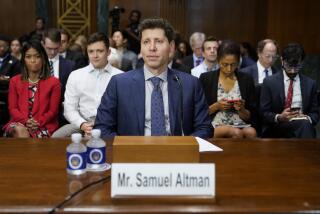No Free Pass for Microsoft
- Share via
In a Senate hearing Tuesday, Microsoft CEO Bill Gates rightly credited his company with helping “contribute over $100 billion to the national economy last year” by having created an operating system used by 90% of the world’s computers, thus simplifying the tasks of writing, selling and using software.
Embracing core American values, Gates said the computer industry has thrived on “freedom and innovation,” but he then cautioned that any government meddling in the industry would stifle its ability to “meet customer demand.” This was a thinly veiled reference to a Justice Department investigation into whether Microsoft is engaging in monopolistic practices.
An exchange early in the hearing raised legitimate questions about whether Microsoft itself has been adhering to the values Gates espoused. Microsoft ally Michael Dell, chief executive officer of Dell Computer Corp., and Senate Judiciary Committee Chairman Orrin Hatch (R-Utah) were discussing whether Microsoft may actually be inhibiting innovation and consumer choice. Hatch mentioned that his staff had recently called Dell’s toll-free phone line to ask for a PC equipped with an Internet browser called Netscape Navigator, the leading rival to Microsoft’s Internet Explorer browser. Over and over, Hatch said, Dell salesmen said “they couldn’t install Netscape because of their agreement with Microsoft” not to offer products that would compete with those of Gates’ company.
At first, Dell said his company doesn’t offer customers Netscape Navigator because “demand for the Netscape browser among our consumer customers has not been sufficient to date.” But Hatch then reasonably asked, “How do you know what your customers want if you don’t explain their choices in the first place?” Later, Dell admitted that his company may not have offered Netscape because of prior exclusionary agreements with Microsoft--agreements that limit consumer choice.
Limiting the choice of Web browsers may not seem like a major abridgment of freedom to most Americans. But given that Microsoft has become a key gateway to millions of Internet sites, its ability to forge deals prohibiting consumers from buying wanted products is a legitimate object of Justice Department attention.
By encouraging Microsoft to make its proprietary agreements more explicit, the Justice Department can help the public and government investigators better understand, as Hatch put it, whether “competition and innovation are being fostered or inhibited.”
“The beauty of the Internet,” Gates said at the hearing, “is its openness.” The Justice Department should take him up on that as it continues its investigation.






